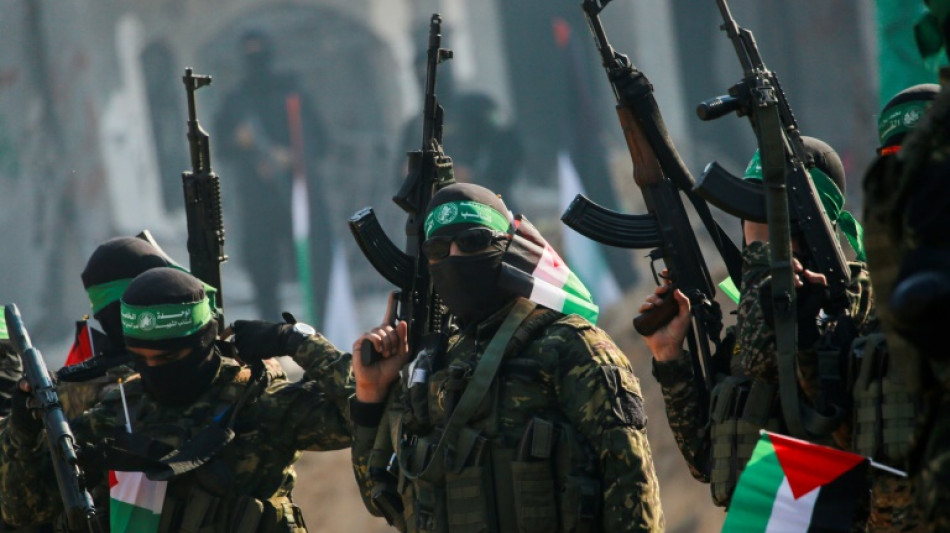
-
 Ruud keeps Barcelona Open defence on course
Ruud keeps Barcelona Open defence on course
-
Trump tariffs could put US Fed in a bind, Powell warns

-
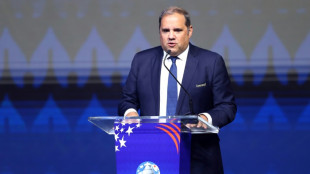 CONCACAF chief rejects 64-team World Cup plan for 2030
CONCACAF chief rejects 64-team World Cup plan for 2030
-
Putin praises Musk, compares him to Soviet space hero
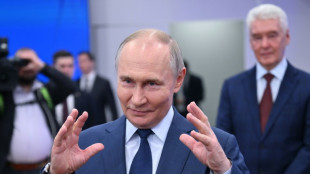
-
 Son to miss Spurs' Europa League trip to Frankfurt
Son to miss Spurs' Europa League trip to Frankfurt
-
US senator in El Salvador seeking release of wrongly deported migrant

-
 Trump tariffs could put the US Fed in a bind, Powell warns
Trump tariffs could put the US Fed in a bind, Powell warns
-
US judge says 'probable cause' to hold Trump admin in contempt

-
 India opposition slams graft charges against Gandhis
India opposition slams graft charges against Gandhis
-
Nate Bargatze to host Emmys: organizers

-
 US Fed Chair warns of 'tension' between employment, inflation goals
US Fed Chair warns of 'tension' between employment, inflation goals
-
Trump touts trade talks, China calls out tariff 'blackmail'

-
 US judge says 'probable cause' to hold govt in contempt over deportations
US judge says 'probable cause' to hold govt in contempt over deportations
-
US eliminates unit countering foreign disinformation

-
 Germany sees 'worrying' record dry spell in early 2025
Germany sees 'worrying' record dry spell in early 2025
-
Israel says 30 percent of Gaza turned into buffer zone

-
 TikTok tests letting users add informative 'Footnotes'
TikTok tests letting users add informative 'Footnotes'
-
Global uncertainty will 'certainly' hit growth: World Bank president

-
 EU lists seven 'safe' countries of origin, tightening asylum rules
EU lists seven 'safe' countries of origin, tightening asylum rules
-
Chelsea fans must 'trust' the process despite blip, says Maresca

-
 Rebel rival government in Sudan 'not the answer': UK
Rebel rival government in Sudan 'not the answer': UK
-
Prague zoo breeds near-extinct Brazilian mergansers

-
 Macron to meet Rubio, Witkoff amid transatlantic tensions
Macron to meet Rubio, Witkoff amid transatlantic tensions
-
WTO chief says 'very concerned' as tariffs cut into global trade

-
 Sports bodies have 'no excuses' on trans rules after court ruling: campaigners
Sports bodies have 'no excuses' on trans rules after court ruling: campaigners
-
Zverev joins Shelton in Munich ATP quarters

-
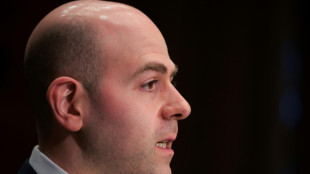 The Trump adviser who wants to rewrite the global financial system
The Trump adviser who wants to rewrite the global financial system
-
US senator travels to El Salvador over wrongly deported migrant

-
 UN watchdog chief says Iran 'not far' from nuclear bomb
UN watchdog chief says Iran 'not far' from nuclear bomb
-
Trump says 'joke' Harvard should be stripped of funds

-
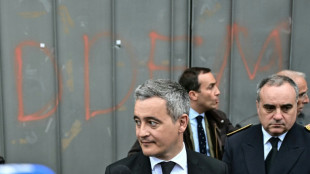 Macron vows punishment for French prison attackers
Macron vows punishment for French prison attackers
-
Canada central bank holds interest rate steady amid tariffs chaos

-
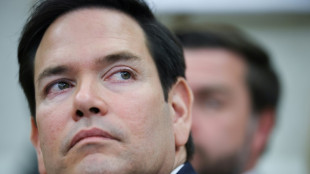 Rubio headed to Paris for Ukraine war talks
Rubio headed to Paris for Ukraine war talks
-
Australian PM vows not to bow to Trump on national interest
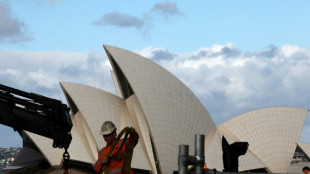
-
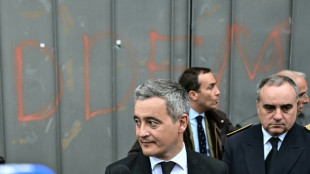 New attacks target France prison guard cars, home
New attacks target France prison guard cars, home
-
Global trade uncertainty could have 'severe negative consequences': WTO chief
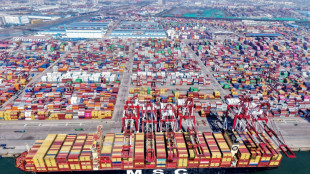
-
 Google facing £5 bn UK lawsuit over ad searches: firms
Google facing £5 bn UK lawsuit over ad searches: firms
-
Onana to return in goal for Man Utd against Lyon: Amorim

-
 Tiktok bans user behind Gisele Pelicot 'starter kit' meme
Tiktok bans user behind Gisele Pelicot 'starter kit' meme
-
'Put it on': Dutch drive for bike helmets

-
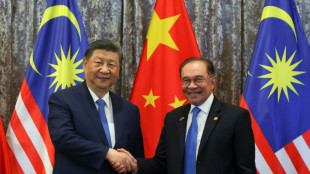 China's Xi meets Malaysian leaders, vows to 'safeguard' Asia allies
China's Xi meets Malaysian leaders, vows to 'safeguard' Asia allies
-
France urges release of jailed Russian journalists who covered Navalny

-
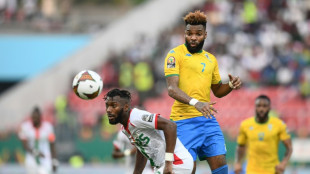 Gabon striker Boupendza dies after 11th floor fall
Gabon striker Boupendza dies after 11th floor fall
-
UK top court rules definition of 'woman' based on sex at birth

-
 PSG keep Champions League bid alive, despite old ghosts reappearing
PSG keep Champions League bid alive, despite old ghosts reappearing
-
Stocks retreat as US hits Nvidia chip export to China

-
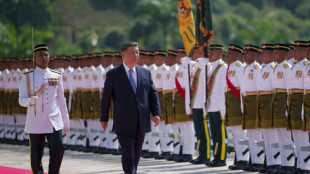 China's Xi meets Malaysian leaders in diplomatic charm offensive
China's Xi meets Malaysian leaders in diplomatic charm offensive
-
Israel says no humanitarian aid will enter Gaza

-
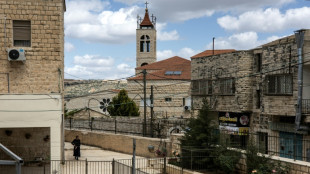 Anxiety clouds Easter for West Bank Christians
Anxiety clouds Easter for West Bank Christians
-
Pocket watch found on Titanic victim to go on sale in UK


Hamas leadership operating behind veil of secrecy
After Israel killed a string of its leaders, Hamas anointed new commanders to top ranks, this time shrouding their identities in secrecy to protect them from assassination.
Israel vowed to crush Hamas in retaliation for the October 7 attack, launching a blistering offensive in Gaza that has massively weakened the movement while reducing much of the territory to rubble.
Hamas's political chief Ismail Haniyeh, the head of its armed wing Mohammed Deif, and Yahya Sinwar, mastermind of the October 7 attack, have all been killed, as have a string of other commanders and political figures.
Yet unlike its Lebanese ally Hezbollah, whose cult of personality around its slain leader Hassan Nasrallah was a key pillar of its identity, Hamas has placed less of an emphasis on its top ranks.
The group has remained tight-lipped over the names of its top ranks, particularly the Ezzedine al-Qassam brigades.
"The name of the head of the Ezzedine al-Qassam Brigades will remain a secret," said a source close to Hamas's armed wing.
Researchers say it is likely that the role was inherited by Yahya Sinwar's younger brother Mohammed, whom Hamas put in charge of the hostages taken into Gaza in 2023.
"Yahya Sinwar's personality was rather unique" and militants viewed him as a "hero", said Laetitia Bucaille, who teaches political sociology at the INALCO institute of Middle East studies in Paris.
Mohammed Sinwar's blood link to the slain commander, coupled with his own experience in the brigades, have conferred upon him an automatic authority, she said.
- Collective leadership -
Israel vowed after October 7 to eradicate Hamas, and while the movement has suffered staggering losses, it has not been crushed.
According to Yasser Abu Heen, founder of the Gaza-based Safa news agency, the loss of so many of its leaders has impacted Hamas, "but only temporarily".
"These hits do not pose an existential crisis, Hamas has its own way of running its institutions," he said. "Israel will not be able to eradicate it."
Speaking to AFP on condition of anonymity, a member of Hamas's political bureau described how it acts as the movement's executive arm, voting on decisions and then taking action.
Political bureau membership is decided by the larger Shura Council, the equivalent of a parliament, he added.
"We will not know the new leaders' names. There's a push to keep their identities secret, and to maintain a collective sense of power," said Leila Seurat of the Arab Centre for Research and Political Studies in Paris.
"This isn't a movement based on a charismatic leadership."
While Hamas has survived thus far, it has yet to make the toughest decision of all concerning its future role in Gaza and in the Palestinian struggle for statehood.
Reduced under daily bombardment, Hamas faces demands not just from Israel but from powers around the world and even from some Palestinians to give up power.
- Dissent -
The Palestinian Authority, whose decades of corruption contributed to Hamas's ascent, has pitched itself as a credible ruling entity for the battered territory.
Within Hamas, discussions are raging on whether to hand over power.
According to sources cited by the Soufan Center in New York: "The internal debate has intensified to the point where some Hamas political leaders have considered breaking with the group's military leaders in Gaza."
Hamas is no stranger to division, with Seurat pointing to crises in the past over a range of issues from the Arab Spring to the movement's alliance with Iran.
But the war with Israel has brought to a head frustration among ordinary Gazans sick of a conflict that has killed many thousands and reduced their territory to rubble.
Musa Abu Marzouk, a leading Hamas figure involved in talks over the ceasefire with Israel, told The New York Times in late February that as far as he was concerned, "if it was expected that what happened would happen, there wouldn't have been October 7".
In March, hundreds of people took to the streets of Gaza, chanting "Out, out, Hamas out!", after a rare call to protest circulated via Telegram.
"Some Palestinians want Hamas to go. Some have always been opposed, while others are just fed up," said Seurat.
Pressure alone will not work, however, because Hamas has no viable competitor, and the people of Gaza simply do not have the means to stand up to it.
"They are still in control," said Bucaille. "While Hamas has been weakened, no one can stand up to it for now."
R.Buehler--VB
